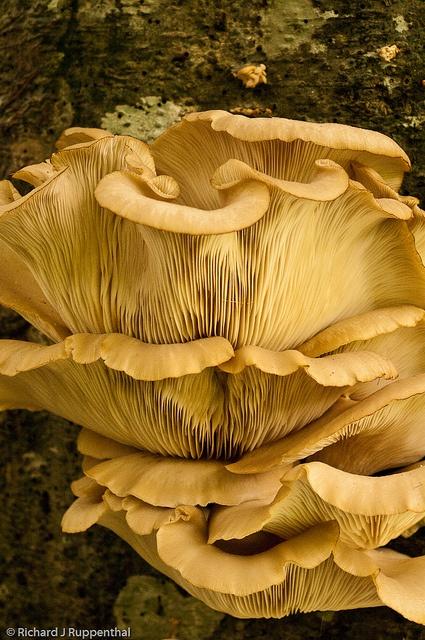
I’m not sure if you’d have any luck selling Hollywood on the idea of a superhero that happens to be a mushroom, but the idea would, at least, have a factual basis.
We should be grateful for mushrooms. Not just because they are delicious on pizza and in stir-frys, but because they also go around behind us, quietly cleaning up our messes, a little bit like Mom does.
Mom, as in Mother Earth, it would seem. The Sucumbíos province of northeast Ecuador is home to nearly a thousand toxic waste pits. And it is here that a group called the Amazon Defense Coalition has recruited specialized fungi with an appetite for toxic waste.
These open toxic pits are the legacy of Texaco’s adventure in the Amazon, subject of the documentary film "Crude." Over a billion gallons of untreated toxic waste were dumped in this nearly pristine rainforest, creating a cancer zone the size of Rhode Island. The spill is the subject of a multi-billion dollar lawsuit filed on behalf of 30,000 inhabitants of the region, whose lives have been devastated by the pollution of land, water and air. Chevron, having taken over Texaco, is responsible, but the company refuses to pay. It has successfully dragged out the action for 22 years, claiming that it will fight “until hell freezes over.”
This is where the U.S.-based non-profit Amazon Mycorenewal Project has joined forces with the Instituto Superior Tecnológico Crecermas (ISTEC), the only higher education institute in the region, to form the Alliance of Bioremediation and Sustainability in Sucumbíos (ABSS).
The organization's plan is clean up the one of the world's largest oil disasters — using giant, petrophilic (oil-loving) fungi. At the same time, ABSS hopes to transform this devastated region into a mushroom competency center, with ties to local indigenous communities -- where this very specialized knowledge, and more, can be exported throughout the world. In this way, the organization “seeks to incubate sustainable community development projects as a method to alleviate poverty and raise the standard of living in the Sucumbíos region.”
When it comes to mankind’s toxic mistakes, of which there are many, mushrooms might just be the superheroes we need. There are over a million known species of fungi, so we are just starting to scratch the surface of what they can do. But not only can fungi (including oyster mushrooms) produce enzymes that can break down the long chain hydrocarbons found in petroleum, but they can also eat polyurethane plastic, absorb heavy metals like mercury and even clean up radioactive spills.
Check out mycologist Paul Stamets’ TED talk about six ways that mushrooms can save the world. Besides cleaning up polluted soils, he also describes making insecticides, treating smallpox and even flu viruses with fungi.
In an earlier post, I wrote about ongoing efforts that can turn plastic waste into food. We should be very grateful that these amazing organisms exist. They just might be able and willing to bail us out of some of our worst self-inflicted disasters. Let’s just hope that when the going gets rough, the mushroom species we need most is not the one that just went extinct as we destroyed its entire natural habitat. It’s another reasons to think twice about our imperialistic conquest of the natural world.
Image credit: Richard Ruppenthal: Flickr Creative Commons
RP recently returned from Abu Dhabi where he attended the World Future Energy Summit as the winner of the Abu Dhabi blogging competition, and he also really likes mushrooms a lot.
Follow RP Siegel on Twitter.

RP Siegel (1952-2021), was an author and inventor who shined a powerful light on numerous environmental and technological topics. His work appeared in TriplePundit, GreenBiz, Justmeans, CSRWire, Sustainable Brands, Grist, Strategy+Business, Mechanical Engineering, Design News, PolicyInnovations, Social Earth, Environmental Science, 3BL Media, ThomasNet, Huffington Post, Eniday, and engineering.com among others . He was the co-author, with Roger Saillant, of Vapor Trails, an adventure novel that shows climate change from a human perspective. RP was a professional engineer - a prolific inventor with 53 patents and President of Rain Mountain LLC a an independent product development group. RP was the winner of the 2015 Abu Dhabi Sustainability Week blogging competition. RP passed away on September 30, 2021. We here at TriplePundit will always be grateful for his insight, wit and hard work.














